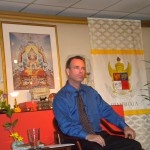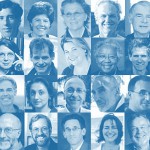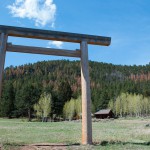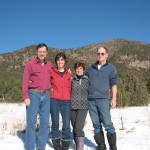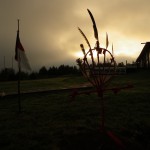Thursday
Buddhism, Psychedelic-Assisted Therapy and the Spiritual Path: An Interview with Dr. Sara Lewis
by Jillian Johnson
Register for the Buddhism, Psychedelic-Assisted Therapy and the Spiritual Path One-Day Retreat
One of the five main precepts in Buddhism is to avoid intoxicants, and it is clear that the use of substances can lead to spiritual bypassing. Yet many renowned practitioners in the West have talked openly about psychedelics as a catalyst to spiritual awakening that led them to the Dharma. Today, we sit down with Dr. Sara Lewis, co-founder of the Memoru Center for Visionary Healing Arts in Boulder, Colorado, and the Center for Psychedelic Studies at Naropa University, where she also served as an associate professor, and author of Spacious Minds: Trauma and Resilience in Tibetan Buddhism, to discuss the use of psychedelics in therapy and along one’s spiritual journey. In this interview, Sara provides us with her personal and professional perspective while considering how such practices may intersect, or not, with the Buddhist path.
Dr. Sara Lewis will hold an online mini-retreat, Buddhism, Psychedelic-Assisted Therapy and the Spiritual Path, through Shambhala Online on July 20, 2025. Click here to learn more and to register.
Jillian: Hi Dr. Lewis, thank you so much for being here with us today to share more about your work and knowledge in the field of psychotherapy and the implementation of psychedelics in mental health settings and spiritual pursuits.
Would you please tell us a little bit about your ‘why’ behind your work in mental health and how it expanded into the area of psychedelic-assisted therapy?
Dr. Lewis: I have long been interested in the mind: concepts of mind, the beauty and the challenges of the mind, and what it means to be human. As an anthropologist of religion and a psychotherapist, I am also deeply interested in how our connection to the divine changes across culture. In one way or another, I have been involved in the field of psychedelic studies for the last twenty years, yet it is more recent that psychedelic therapy has become more mainstream. As a Buddhist, I continue to see my clinical work as a skillful means to work with suffering in the world.
Jillian: How fascinating. We heard you opened a new clinic? Congratulations and please tell us more!
Dr. Lewis: Yes! Memoru Center for Visionary Healing Arts is a contemplative-based psychedelic training institute and community clinic where we offer legal psychedelic therapy. We can accept out of state clients who wish to travel to Colorado for a psilocybin experience. The Memoru clinic has a strong connection to Naropa University, where most of the cofounders have either worked as faculty or completed their studies.
Jillian: That’s very exciting, congratulations again! Speaking of legal psychedelic therapy, what do you feel are the current social and political climates surrounding the utilization of substances (primarily psilocybin and MDMA) in controlled mental health and spiritual settings? Are you noticing more or less acceptance in your typical day-to-day professional and personal interactions than in recent years?
Dr. Lewis: In general, there is a lot of interest and excitement for the therapeutic use of psychedelics. Many people understand that among veterans, abuse survivors, and others with PTSD, our standard treatments often fall short. As well, there is deep potential for plant medicines and psychedelics for those navigating the end of life. At Memoru, we will have a family program that aims to work with entire families–this might be when one person is at the end-of-life, navigating the post-partum period after birth, couples work, or a veteran returning home. When psychedelic care is done in a way that is slow, intentional and safe, I think there is significant support. At the same time, our basic health care infrastructure is not really set up to easily make this type of work accessible. Psychedelics do not fit easily into a capitalist system and without sounding too conspiratorial, the global Big Pharma system has many reasons to hinder the kind of paradigm shift many of us interested in psychedelic-assisted therapy are hoping for. Still, I believe that most of us yearn for change. With psilocybin now legal in various capacities in Oregon, Colorado and most recently, New Mexico, I believe in the next 5-10 years we will see a significant shift in accessibility of these modalities in North America and around the globe.
Jillian: Thank you so much for this thoughtful response, Sara. It is comforting to know that all areas of support are being explored for those seeking treatment and their families. Do you feel momentum and public support will eventually result in the integration of psychedelics into mainstream healthcare?
Dr. Lewis: Absolutely. And this could go the other direction as well if we do not take seriously the ethical responsibility to work with these medicines in a safe way. Many cultures across the world understand plant medicines to be living beings with sentience. They shouldn’t be “taken” in an extractive way. If we can relate with the cultures ethically who are stewards of these medicines, and collaborate and learn from them, I think we may have good results. For society as a whole to open up to them, I think we are in a critical period of needing to demonstrate that as a human society we can be trusted with these powerful agents. It’s up to us! But I feel the plants and fungi also want to help.
Jillian: I love your statement “…I feel the pants and fungi also want to help” and the care you show towards our Plantae and Fungi kingdoms. Have you noticed an increase in the number of patients and clients willing to consider psychedelics as part of their treatment plan for depression, anxiety, addiction, PTSD, etc.?
Dr. Lewis: Yes, very much so. Many people have earnestly tried conventional therapies without much relief. There are also many people seeking to work with suffering within the human condition in a way that honors and deepens their spiritual path. So there’s sort of a question about whether the work is “mental health work,” “spiritual work,” or something else. There is also a lot of joy, beauty and connection, something that may not be fully honored in a traditional treatment plan that tends to focus rather narrowly on the eradication of symptoms.
Jillian: It sounds like a very integrative approach that is catered to each individual’s unique needs and requirements, which is still lacking in many areas of healthcare. Would you tell us more about a situation(s) where the assistance of psychedelics, in a therapeutic application, aided a client in a breakthrough (mental, emotional and/or spiritual) that may not have occurred, or may have taken longer to occur, with more traditional mental health practices? Are you able to expand on the experience, at least from your perspective, and how that felt?
Dr. Lewis: I have had so many clients with intergenerational and ancestral experiences, even when they weren’t necessarily seeking that out. This has looked like deeply experiencing and seeing the ways that an ancestral burden has been passed down through the ages, visitations from elders who have passed, and sometimes a deep experience of connection and homecoming into one’s ancestral lineage. This happens so frequently that I myself, have embarked on a formal process of Ancestral Lineage Healing over the past year to better learn to work with my own spiritual lines. We will have more on this in the mini-retreat!
Jillian: This sounds not only incredibly interesting, but heart-warming as well. What a beautiful experience for both you and your clients. I am intrigued to hear more at the mini-retreat! In which situation(s) do you recommend someone not take psychedelics or partake in psychedelic-assisted therapy if it is a path they are interested in pursuing for their mental health and/or spiritual journey?
Dr. Lewis: These agents can be very powerful and it’s important to know if it’s the right time. I receive many referrals for people who have had negative even traumatic experiences resulting from psychedelics. Beyond contraindicated conditions like psychosis and mania (though even those who have these histories may be able to work in psychedelics under certain conditions), I wouldn’t recommend jumping into working with them if things aren’t stable enough to be able to accommodate potentially big and sometimes disruptive shifts. Sometimes these medicines work through disruption and dissolving: this could be to harmful patterns, misperceptions, ego-clinging, itself, or even the dissolving of relationships, career or other major disruptions.
Jillian: This is a very strong point to consider. Thank you for mentioning ‘being ready’ for shifts. While it is often said “The only constant change,” it is important to remember to be as grounded as possible before inviting a powerful catalyst for said change. What would you recommend as some of the “should” and “should nots” before holding a psychedelic session in terms of choosing an appropriate environment, monitoring one’s current mental state, integrating other practitioners and/or professionals, etc.? In a sense, what would you recommend in terms of setting yourself up for an enlightening experience?
Dr. Lewis: Most people do not need to work with a psychedelic therapist or clinician to have a safe and meaningful experience. This was recognized in the state of Colorado that has approved personal use of psilocybin mushrooms for anyone 21 years and over. Colorado also allows for individuals to embark on training as facilitators who do not hold a clinical license, again recognizing that many people can be trained to hold space for someone else ethically and with care. However, if the intention is really to engage in therapeutic work, it would be important to seek out a trained and licensed clinician. Sometimes it can be hard to really discern whether the work is “therapeutic” or whether it is “spiritual.” But this isn’t a new problem. Many cultures around the world do not separate the paths of healing and spirituality. What is most important is to feel that the setting and the practitioner is slow, intentional, and rooted in some kind of practice lineage. I would not get involved with anyone who doesn’t seem to have any mentors, elders, or community of accountability.
Jillian: Very true, consistent and quality integrative care that takes into account physical, mental, spiritual, and emotional health of an individual is a hurdle that seems to continually appear, at least in American culture. On a more casual note, if you were talking freely (perhaps in a bar) to a captivated audience, what would your elevator pitch be when introducing a metaphysical discussion on the topic of psychedelics in therapy or on one’s spiritual journey?
Dr. Lewis: I probably wouldn’t make one. A person really needs to feel the call, so to speak, on their own! If you listen and hear the call, however, many of us all across the globe would love nothing more than to dive into that conversation!
Jillian: What a conscientious approach. Wait for the invitation. And now for our final interview question, what has the use of psychedelics done for your personal spiritual growth? Do you have any stories you’re willing to share with us?
Dr. Lewis: Yes, but I will save these for the mini-retreat. Hope you can join!
Thank you, Sara, we’re looking forward to it! Myself and Shambhala Online thank you for taking the time to answer our questions about these exciting advances in patient/client care. You have touched on many dynamic aspects regarding the use of psychedelics in client care and we are eager to dive deeper on July 20!
Dr. Sara Lewis is Co-founder of Memoru Center for Visionary Healing Arts, a psychedelic clinic and training institute in Boulder, Colorado. She served as Associate Professor at Naropa University in Buddhist-Informed Counseling, where she also co-founded the Center for Psychedelic Studies. Sara is author of Spacious Minds: Trauma and Resilience in Tibetan Buddhism, an ethnographic study of mind, memory and recovery from collective trauma in the Tibetan exile community. She teaches in Shambhala on the topic of Buddhism and psychedelics, and has also served in a number of leadership roles, including a term on the Interim Shambhala Board.
Entries filed under Community Articles
An Elder Warrior’s Marathon – HIGHLIGHT
This article was kindly submitted by Shastri Susan Chapman, one of four shastris (senior teachers) appointed by Sakyong Mipham Rinpoche to serve the Pacific Northwest region of Shambhala. by Shastri Susan Chapman Seven months ago my father’s life took a dramatic turn and he’s now confined to a ... continuePosted June 9, 2012 by
On Aging: My Big Yellow File – HIGHLIGHT
COLUMN: Aging in Shambhala article by Richard Reoch Preparing for death is highly recommended as a part of contemplative practice. Recognizing that this life could end at any moment provides encouragement for us to fully engage with the world while we can. In addition to contemplating the inevitability ... continuePosted June 6, 2012 by Richard_Reoch
Interview with Sergeant Paul Kendel – HIGHLIGHT
Interview with Paul M. Kendel (SSG Ret.), M.A. ~ author of Walking the Tiger’s Path: A Soldier’s Spiritual Journey in Iraq, the book chronicling a military deployment in Iraq, experiences of doubt and disillusionment, and eventual introduction to and connection with the Shambhala Buddhist teachings by Shambhala ... continuePosted June 4, 2012 by Travis_May
Exploring Communal Space – HIGHLIGHT
Foundations of Shambhala: a gathering by Amanda Hodson Here at the Davis Shambhala Center we have a Monday night social and discussion group for shamatha students, new practitioners and people interested in learning about meditation. It’s called Foundations of Shambhala. The group provides a space for people to ... continuePosted May 30, 2012 by
Living in the Challenge – HIGHLIGHT
On serving in the U.S. Navy and being a Shambhala Buddhist by Ben Biggs I get a lot of questions from the Shambhala Buddhist community about what it’s like being in the Navy and why I joined… so here you go! What it’s like: one person’s experience Being in the ... continuePosted May 28, 2012 by
The Mind of Mindfulness
by Irini Rockwell The first annual International Symposia for Contemplative Studies held in Denver April 26th to 29th was the place to be for anyone interested in mindfulness and brain research. 700 of us from all over the world gathered together to explore this cutting edge endeavor ... continuePosted May 26, 2012 by
Gaining Ground against Beetle Infestation – HIGHLIGHT
Report from Shambhala Mountain Center by Shambhala Times Regional Correspondent Leslie Witt Brown, dead ponderosa pines have given way to open ground as Shambhala Mountain Center (SMC) battles to save its forest from the mountain pine beetle. Now in the second year of an aggressive, proactive program of ... continuePosted May 25, 2012 by
Submit Your Videos! – HIGHLIGHT
Introducing the new YouTube channel for the Shambhala community, now arriving online: Shambhala Community Channel by Anna Weinstein The inspiration behind the effort to create a community youtube channel is to foster a further sense of a global Shambhala community through the creation of an online forum in ... continuePosted May 20, 2012 by anna_weinstein
Shambhala at Earth Day Summit, Madison, WI
The Madison Shambhala Center was delighted to attend the sixth annual Nelson Institute Earth Day Summit on April 16th at the Monona Terrace. This year’s theme was sustainability, security and happiness on a finite planet. Among the many interesting speakers was Lyonpo Yeshe Zimbo, the Minister ... continuePosted May 18, 2012 by
Sangha Conversations on Aging – HIGHLIGHT
COLUMN: Aging in Shambhala Updates from Boulder, Halifax and New York compiled by Andrea Sherman and David Whitehorn This article is an introduction to three active Shambhala centers that are cultivating support at the local level for the increasing numbers of older Shambhalians. Never before have so many people ... continuePosted May 11, 2012 by
Dorje Khyung Dzong Welcomes New Directors – HIGHLIGHT
President Richard Reoch thanks the previous directors and introduces the new directors of Dorje Khyung Dzong After sixteen years as Resident Directors of Dorje Khyung Dzong (DKD), Bruce and Melissa Robinson will be retiring from this post in early September. I wanted to let those of you ... continuePosted May 3, 2012 by
Shamanic Practice Meets Shambhala Culture – HIGHLIGHT
Commemorating Earth Day A conversation between Shambhala Times Editor Sarah Lipton and Leila Bruno, Nancy Sherwood and Patricia Hayward The 4th Nova Scotia Grandmothers Shamanic Convergence is coming to Dorje Denma Ling September 27-30, 2012. This annual gathering celebrates and explores how shamanic practice can be used for ... continuePosted April 29, 2012 by
The Earth Is Always Rising In Shambhala – HIGHLIGHT
Commemorating Earth Day by David Wimberly The Earth is always rising in Shambhala. This iconic photograph, taken from space, of the lushly living blue-green earth rising over the starkly lifeless moonscape so vividly changed the consciousness of humanity about what we are in this universe. Today the teachings ... continuePosted April 28, 2012 by
Cultivating Service with the Merit Exchange – HIGHLIGHT
Commemorating Earth Day by Ryan Thompson founder of the Merit Exchange Spring came a bit early this year in Chicago, but on Saturday morning it was clear that winter wouldn’t let go without a fight. Only a handful of volunteers made it to the Iron Street Urban Farm, including ... continuePosted April 27, 2012 by
A Slightly Different 99 Percent – HIGHLIGHT
Commemorating Earth Day GreenFaith Fellowship: Chapter 2 Reports on an Environmental Justice Retreat click here to read the first story by Irene Woodard Newark International is the airport I generally leave from to go on Shambhala retreats and send my kids to Sun Camp. This past November, I went on ... continuePosted April 21, 2012 by
![]() RSS feed for the Community Articles category
RSS feed for the Community Articles category
View all posts from authors in Community Articles: jillian_johnson










